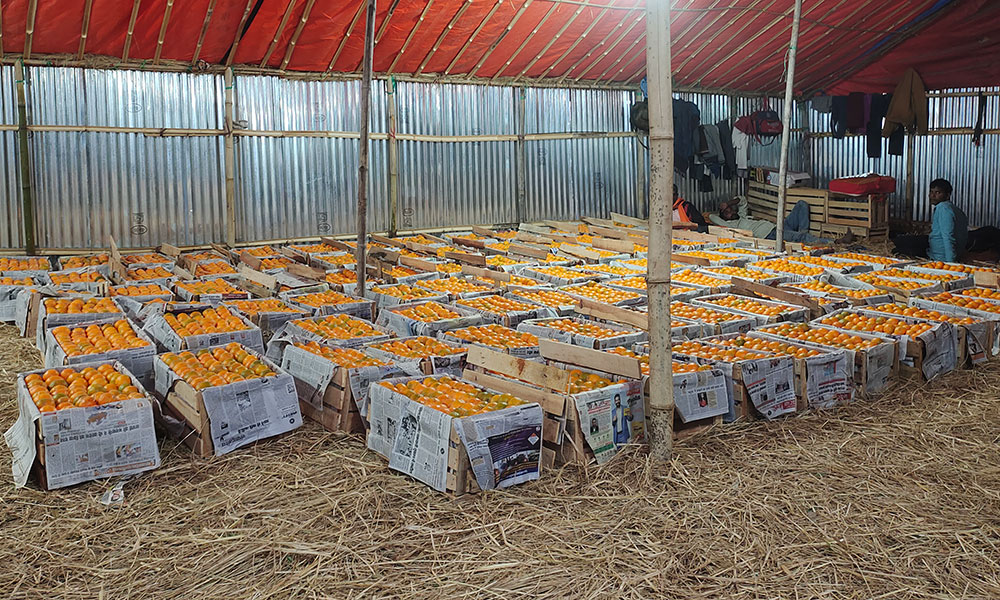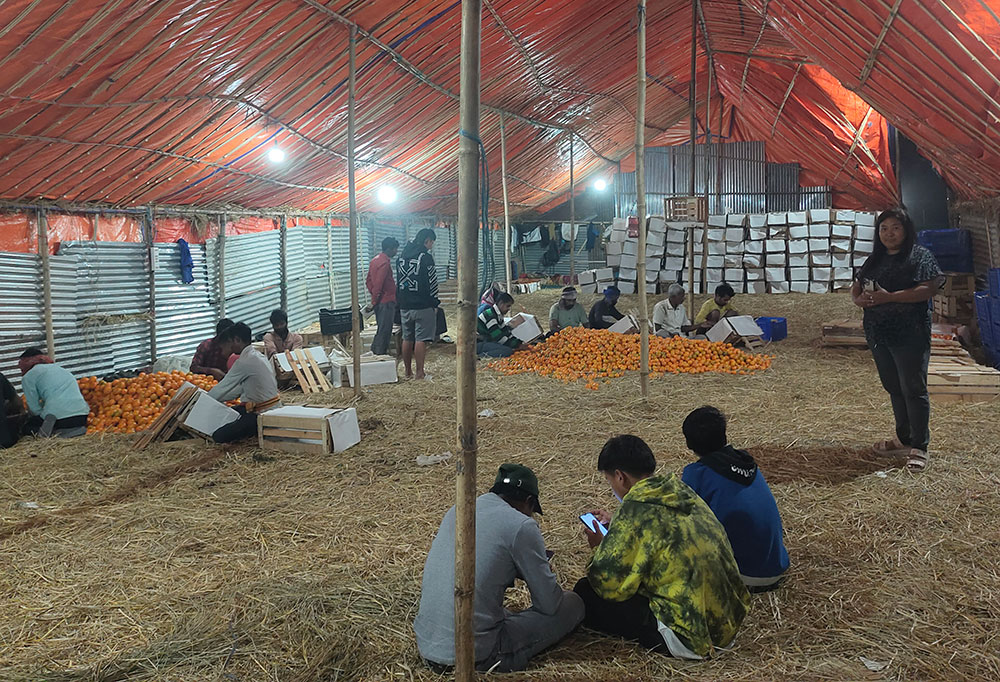Lhakpa Quendren
Gelephu — The Mandarin exporters in Gelephu at the peak of the export season are facing a shortage of wooden crates. This has sparked concerns about potential export delays and damage to their produce.
After the government stopped crate imports from India last year, frustrated exporters say that sawmill operators in the country are unable to meet their demand for the required crates, despite having a formal supply agreement.
Chimi, an exporter from Paro, said that sawmill operators are unable to fulfill orders on time, even after paying them in advance. “I paid Nu 570,000 in advance but received only 4,600 wooden crates. When requesting faster delivery, they demanded an additional advance.”

Work at Gelephu export depot has slowed owing to shortage of wooden crates
“Wooden crate imports are restricted, but a sustainable and timely solution is needed. We are willing to pay any cost to prevent depot spoilage,” he said. “We have raised this issue several times with both local authorities and relevant agencies. We have yet to receive a response from them.”
According to the exporters, the imported wooden crates were stopped at the border gate, with some truckloads unloaded at the Regional Revenue and Customs Office (RRCO) in Gelephu.
“While we await supply from our sawmill operators, a temporary measure of allowing imports can help clear the mandarins at the depot. Many mandarins were dumped in pits due to their rapid spoilage,” said another exporter, Madan Prasad Oli.
Kinley Wangdi from Paro said they have been making adjustments with friends to tackle shortages.
“Now, they are also facing shortages. I received about 7,000 crates out of the 20,000 ordered.”
“I have more than 20 labourers for grading and packing,” he said. “Work progress has been hampered for over a week due to the crate shortage. We couldn’t work the entire day today.”
Given that the crate shortage has slowed down their work progress, there are concerns about potential delays in Mandarin exports, considering the export season concludes by the end of this month.
“It has been about a month since the export season started, and I have completed about 30 percent of the work for this season. There are still about 40 to 50 truckloads remaining,” said another exporter.
The shortage of wooden crates has also affected Mandarin sellers like Tsheltrim Jamtsho from Gongphu in Zhemgang. “I left for the depot as early as 2am with plans to return home the same day. However, I have to wait the entire day as the exporter assured me that some crates will arrive in the evening,” he said.
However, exporters with sufficient wooden crates at their depot argue they invested money in crate orders from local sawmill operators. Meanwhile, those facing shortages initially focused on buying mandarins, expecting to obtain a permit to import from India at a cheaper rate.
An exporter from Dagana, Sangay Choden, said that other exporters expected the government to permit import and waited until the last moment. She added that there was a rush when import was disallowed, as everyone placed orders in local sawmills.
“As they face a shortage of crates, I have an advantage because my sawmill operator at Jigmeling has been providing a sufficient supply,” she said, adding that she expects to double her exports this year compared to the 70 truckloads last year.
Sawmill operators in Phuentsholing said making wooden crates from quality timber is expensive. Rinzin Namgyel, the operator of Sha Karma Wood, said, “Currently, most sawmills produce crates from rejected woods. If we use quality wood, the current selling price of Nu 95 per box does not cover the cost of production.”
There are 13 orange exporters in Gelephu who buy mandarins from Punakha, Tsirang, Dagana, Sarpang, Zhemgang, and Trongsa. They said that they had placed orders for wooden crates with sawmills in Phuentsholing, Wangdue, Thimphu, Paro, Tsirang, Dagana, and Sarpang.
Exporters, sawmills, the Bhutan Chamber of Commerce and Industry, and the Association of Wood-Based Industries agreed to use local crates this year. Last year, imports amounted to Nu 25.5 million when sawmill operators couldn’t meet the demand.
It was learned that relevant officials recently held a meeting to address the issues. However, officials from the RRCO in Gelephu could not be contacted for comment.


